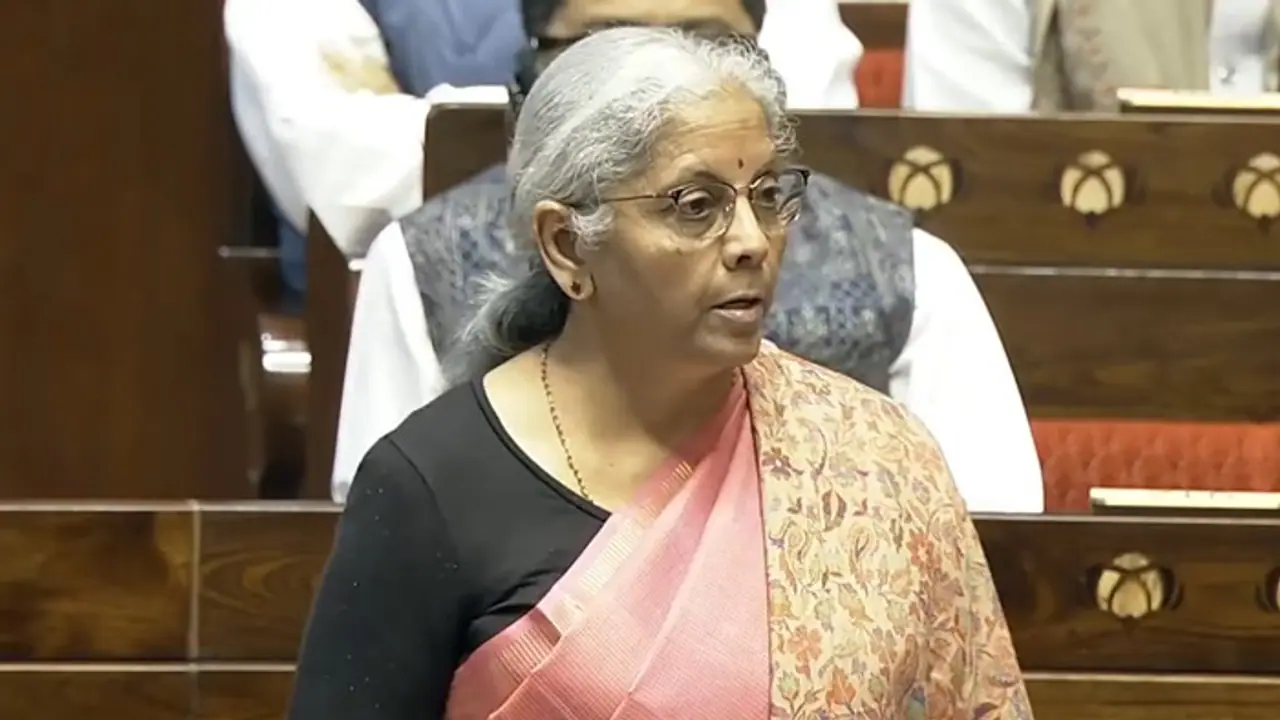Nirmala Sitharaman’s Rajya Sabha speech highlights India's resilient Constitution, critiques Congress amendments for power preservation, and addresses issues like curtailing freedoms and denying Bharat Ratna to Dr. Ambedkar.
Finance Minister Nirmala Sitharaman on Monday highlighted that India’s Constitution has withstood the test of time over the past 75 years, unlike many of the 50 nations that adopted their constitutions around the same period, most of which have since revised or rewritten theirs.

While initiating a discussion in the Rajya Sabha on the 'Glorious Journey of 75 Years of the Constitution of India,' she paid tribute to the 389 members of the Constituent Assembly, including 15 women, who undertook the formidable task of drafting India’s Constitution under challenging circumstances.
The Constitution of India "has stood the test of time," she said. "Today we are extremely proud of the way India's democracy is growing."
As the country marks the 75th year of its Constitution, "it is time to reaffirm our commitment to build India, that is Bharat, that shall uphold the spirit enshrined in this sacred document," she added.
Sitharaman emphasized that India and its Constitution stand in a league of their own. She noted that after the Second World War, more than 50 countries gained independence and adopted their own constitutions.
"But many have changed their constitutions, not just amended them, but literally changed the entire feature of their constitution. But our Constitution has stood the test of time, ofcourse, it yielded itself to very many amendments," she said, adding the amendments were the need of the hour.
FM Sitharaman attacks Congress, says
During the Constitution debate in the Rajya Sabha, Finance Minister Nirmala Sitharaman sharply criticized former Congress leaders, especially Jawaharlal Nehru and Indira Gandhi, claiming that their amendments were designed more to preserve power than to strengthen democracy.
She also pointed out that while many nations that gained independence after World War II made significant changes to their constitutions, India's Constitution has remained resilient despite numerous amendments.
In her speech, Sitharaman also accused the Congress for denying Bharat Ratna to Dr BR Ambedkar.
WATCH: Nirmala Sitharaman's address in Rajya Sabha
Sitharaman's address in RS: Top Quotes
1. "Post Second World War, over 50 countries had become independent and had their Constitution written. But many have changed their Constitutions, not just amended them but literally changed the entire feature of their Constitution. But our Constitution has stood the test of time, of course, yielded itself to very many amendments."
2. "The Prime Minister I (Kameshwar Singh) am constrained to say is creating a bad precedent by sowing the seeds of executive dyspotism, and playing with the supremacy of the Constitution for party advantages. Prior to the Amendment we have recorded action taken by that governemnt to curtail freedom of speech," FM Sitharaman quotes Constituent assembly members as she lashes out at Nehru on the first Constitutional amendment of 1951.
3. "The Judiciary was held in contempt they had to be committed judiciary or they were not respected. Constitutional amendment was brought in to nullify a judgement that arose in the case of Indira Gandhi vs Rajnarayan."
4. "Kursi bachane ke liye hum court ka verdict aane se pehle hum amendment karenge (We will make an amendment in Parliament before the court's verdict comes in, to save our chair)," Sitharaman on 39th Constitutional amendment.
5. "The Supreme Court in 1950 had ruled in favour of the Communist magazine "Cross Roads" and the RSS organisational magazine "Organizer". But in response, the (then) interim government thought that there was a need for a first Constitutional amendment and that was brought in by the INC and it was essentially to curb the freedom. So India, a democratic country which prides itself even today about freedom of expression saw the first interim government coming up with a Constitutional amendment which was to curb the freedom of speech of Indians and that within one year of adoption of the Constitution."
6. "Congress brazenly kept amending Constitution to help family, dynasty. Amendments were not about strengthening democracy but protecting those in power."
7. "Majrooh Sultanpuri and Balraj Sahni were both jailed in 1949. During one of the meetings organized for the mill workers in 1949, Majrooh Sultanpuri recited a poem that was written against Jawaharlal Nehru and therefore he had to go to jail. He refused to render an apology for the same and was jailed...Congress's record of curtailing freedom of speech didn't confine it to these two people. "Nehru", a political biography which was written by Michael Edwards in 1975 was banned. They banned also a film called "Kissa Kursi Ka" just because it questioned Prime Minister Indira Gandhi and her son."
8. "Congress did not allow Babasaheb Ambedkar's photo to be installed in the central of the old Parliament house for decades, he was denied Bharat Ratna."
9. "Not only did they called PM Modi a 'chor', they called me a liar," says FM Sitharaman after Jairam Ramesh calls her a 'liar'
10. "I know of political leaders who have chosen to have the children named after MISA to remember those black days and now they wouldn't even mind having an alliance with them."
11. "The first act we passed in the new Parliament building was the Reservation of Women Act. BJP stands for women's rights. Rajiv Gandhi had 426 members in Lok Sabha, 159 members in Rajya Sabha but did not have the conviction to pass women's reservation bill, they have been anti-women always."
